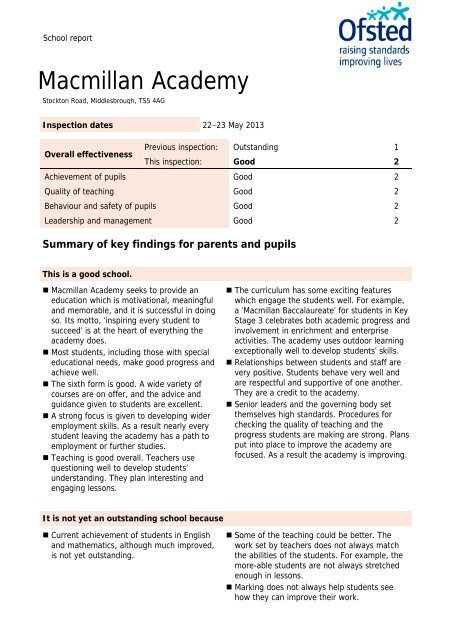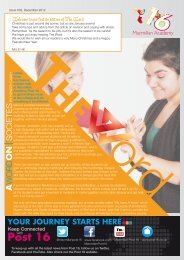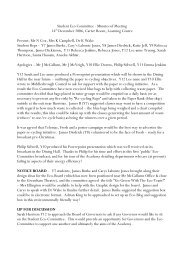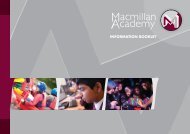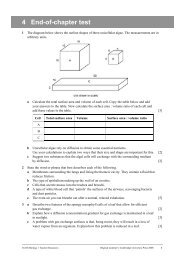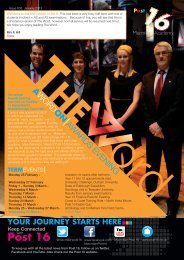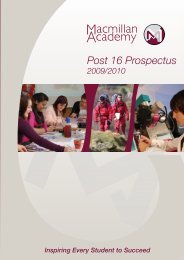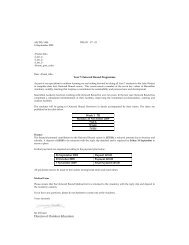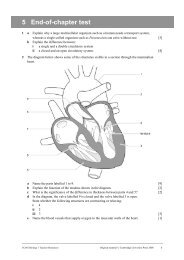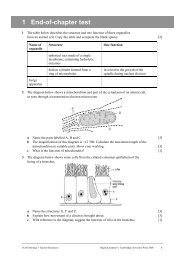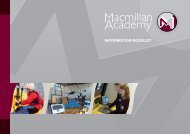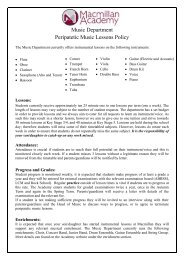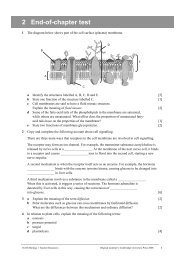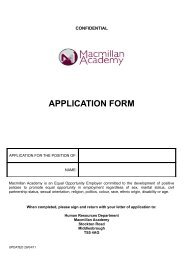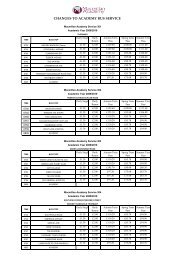Ofsted Report - Macmillan Academy
Ofsted Report - Macmillan Academy
Ofsted Report - Macmillan Academy
Create successful ePaper yourself
Turn your PDF publications into a flip-book with our unique Google optimized e-Paper software.
School report<br />
<strong>Macmillan</strong> <strong>Academy</strong><br />
Stockton Road, Middlesbrough, TS5 4AG<br />
Inspection dates 22−23 May 2013<br />
Overall effectiveness<br />
Previous inspection: Outstanding 1<br />
This inspection: Good 2<br />
Achievement of pupils Good 2<br />
Quality of teaching Good 2<br />
Behaviour and safety of pupils Good 2<br />
Leadership and management Good 2<br />
Summary of key findings for parents and pupils<br />
This is a good school.<br />
• <strong>Macmillan</strong> <strong>Academy</strong> seeks to provide an<br />
education which is motivational, meaningful<br />
and memorable, and it is successful in doing<br />
so. Its motto, ‘inspiring every student to<br />
succeed’ is at the heart of everything the<br />
academy does.<br />
• Most students, including those with special<br />
educational needs, make good progress and<br />
achieve well.<br />
• The sixth form is good. A wide variety of<br />
courses are on offer, and the advice and<br />
guidance given to students are excellent.<br />
• A strong focus is given to developing wider<br />
employment skills. As a result nearly every<br />
student leaving the academy has a path to<br />
employment or further studies.<br />
• Teaching is good overall. Teachers use<br />
questioning well to develop students’<br />
understanding. They plan interesting and<br />
engaging lessons.<br />
• The curriculum has some exciting features<br />
which engage the students well. For example,<br />
a ‘<strong>Macmillan</strong> Baccalaureate’ for students in Key<br />
Stage 3 celebrates both academic progress and<br />
involvement in enrichment and enterprise<br />
activities. The academy uses outdoor learning<br />
exceptionally well to develop students’ skills.<br />
• Relationships between students and staff are<br />
very positive. Students behave very well and<br />
are respectful and supportive of one another.<br />
They are a credit to the academy.<br />
• Senior leaders and the governing body set<br />
themselves high standards. Procedures for<br />
checking the quality of teaching and the<br />
progress students are making are strong. Plans<br />
put into place to improve the academy are<br />
focused. As a result the academy is improving.<br />
It is not yet an outstanding school because<br />
• Current achievement of students in English<br />
and mathematics, although much improved,<br />
is not yet outstanding.<br />
• Some of the teaching could be better. The<br />
work set by teachers does not always match<br />
the abilities of the students. For example, the<br />
more-able students are not always stretched<br />
enough in lessons.<br />
• Marking does not always help students see<br />
how they can improve their work.
Inspection report: <strong>Macmillan</strong> <strong>Academy</strong>, 22–23 May 2013 2 of 9<br />
Information about this inspection<br />
• The inspectors observed teaching and learning in 46 lessons and parts of lessons. Two<br />
observations were conducted jointly with members of the senior leadership team.<br />
• The inspectors observed students during tutorial, registration, break times, and around the site.<br />
• Discussions were held with the Executive Principal, the Principal, members of the leadership<br />
team, two groups of teaching staff (including middle leaders) and three governors, including the<br />
Chair of the Governing Body.<br />
• The inspectors spoke to many students in lessons, and they spoke formally to four groups of<br />
students on the first day of the inspection.<br />
• The inspectors looked at a range of evidence including: the academy’s improvement plan; the<br />
academy’s own evaluation of its work; the academy’s data for tracking students’ progress; the<br />
work students were doing in their books; the academy’s documentation relating to safeguarding;<br />
documents relating to the monitoring of the quality of teaching; and information about teachers’<br />
professional development.<br />
• The inspectors took into account the responses to the academy’s own surveys. There were 81<br />
responses from parents to the online questionnaire (Parent View). They also took into account<br />
the responses from the staff questionnaire.<br />
Inspection team<br />
Michael Wardle, Lead inspector<br />
Frank Cain<br />
David Griffiths<br />
Christine Kennedy<br />
Colin Scott<br />
Additional Inspector<br />
Additional Inspector<br />
Additional Inspector<br />
Additional Inspector<br />
Additional Inspector
Inspection report: <strong>Macmillan</strong> <strong>Academy</strong>, 22–23 May 2013 3 of 9<br />
Full report<br />
Information about this school<br />
• This is a larger than average-sized secondary academy. The sixth form is also larger than<br />
average for a secondary academy.<br />
• The proportion of students known to be eligible for the pupil premium is above average. The<br />
pupil premium provides additional funding for children in local authority care, those whose<br />
parents are in the forces and those known to be eligible for free school meals.<br />
• The proportion of students identified with special educational needs and supported through<br />
school action is average.<br />
• The proportion of students supported at school action plus or with a statement of special<br />
educational needs is below average.<br />
• The proportion of students from minority ethnic groups is above average.<br />
• The academy meets the government’s current floor standards, which set the minimum<br />
expectations for students’ attainment and progress in English and mathematics.<br />
• The academy has a variety of awards, including Learning Outside the Classroom (gold award),<br />
Adventure mark, Outdoor Learning Quality Badge, and Eco School (Green Flag).<br />
What does the school need to do to improve further?<br />
• Improve students’ achievement, especially in English and mathematics by:<br />
- accelerating the progress of the more-able students in order to increase the number who get<br />
A*/A grades at GCSE and A* to B grades at A level and AS level<br />
- increasing the opportunities students have to write at length in different subject areas<br />
- embedding the academy-wide reading programmes, so that recent improvements in standards<br />
of reading continue<br />
- providing more chances for students to practise their mathematical skills in meaningful<br />
situations, for example, to solve problems related to everyday life.<br />
• Improve the quality and impact of teaching by:<br />
- giving students clear guidance through regular marking so they know how to improve their<br />
work and ensuring that they have the opportunity to make those improvements<br />
- using assessment information to match work and activities more precisely to students’<br />
individual needs<br />
- giving the most-able students work that is suitably demanding in all lessons.
Inspection report: <strong>Macmillan</strong> <strong>Academy</strong>, 22(23 May 2013 4 of 9<br />
Inspection judgements<br />
The achievement of pupils<br />
is good<br />
• Students make good progress from their starting points. They attain above-average standards by<br />
the end of Year 11 on a variety of indicators. There was a dip in 2012 in the key measure of the<br />
proportion of students attaining five A* to C grades at GCSE including English and mathematics.<br />
However, inspection analysis indicates that improvements are in evidence for students currently<br />
at the academy. The decrease in attainment on this measure has not only been arrested, it has<br />
been reversed. Current achievement of students in English and mathematics, although much<br />
improved, is not yet outstanding.<br />
• Attainment in English literature, biology, chemistry, physics, information and communication<br />
technology and modern languages, among other subjects, is strong. However, too few students<br />
attain the highest grades of A* and A at GCSE.<br />
• Progress made by students in the sixth form is good, taking into account their starting points.<br />
They are very successful in gaining places at university, training or employment. The<br />
‘professional placement programme’ supports this well. Progress in science subjects,<br />
mathematics, psychology, sociology and politics is particularly strong. Personal development in<br />
the sixth form is a strength.<br />
• Students known to be eligible for free school meals and supported through the use of pupil<br />
premium make progress similar to other students in school. They achieve standards that are, on<br />
average, half a grade lower per subject than other students in the academy. The progress they<br />
make, when compared to similar students across the country, is better than it is nationally. This<br />
means that the academy is providing well for these students, and is promoting equality of<br />
opportunity.<br />
• Students who are disabled and those who have special educational needs make good progress in<br />
the academy. In lessons, these students are fully involved in their learning. Inspectors also saw<br />
examples where students were overcoming difficulties and making good progress. For example,<br />
students who speak English as an additional language were found to be making good headway.<br />
• Students from minority ethnic groups make good progress.<br />
• The academy enters students in some subjects early for GCSEs. This is done carefully so that it<br />
maximises achievement.<br />
• Students’ progress in literacy is good. The academy is using a variety of programmes and<br />
strategies to ensure that students read widely and develop their literacy skills. This is having a<br />
positive impact on achievement. <strong>Academy</strong> leaders are aware that these programmes are still<br />
relatively new, and that they need monitoring so that they have the greatest impact on students’<br />
literacy.<br />
• Almost all parents rightly regard their children as making good progress and lesson observations<br />
during inspection confirm this.<br />
• <strong>Academy</strong> leaders are focused on continually improving teaching, and therefore achievement<br />
continues to improve.<br />
The quality of teaching<br />
is good<br />
• Most of the teaching observed during the inspection was good, and some outstanding practice<br />
was seen. Inspectors agree with the overwhelming majority of parents who say that teaching is<br />
good. Students’ books and the progress they make indicate that teaching seen during the<br />
inspection is typical of teaching over time.<br />
• In the best lessons teachers’ planning makes sure that all students are given work that gets the<br />
best out of them. In these lessons students learn quickly due to a range of different teaching<br />
methods used. Teachers ask searching questions to get students thinking and to see how much<br />
they have understood. They then use information about how well students have learned to help<br />
them plan future lessons.
Inspection report: <strong>Macmillan</strong> <strong>Academy</strong>, 22(23 May 2013 5 of 9<br />
• For example, in a Year 8 English lesson students were identifying techniques used by writers to<br />
‘grip’ their readers. Here, students were fully involved in discussions about suspense techniques<br />
and the teacher ensured that all of the students were stretched. The teacher had very high<br />
expectations of the students, and they rose to the challenge.<br />
• In a Year 10 mathematics lesson students were animatedly discussing complex concepts. The<br />
teacher gave very precise explanations, and activities ensured that all of the students were<br />
stretched. Marking was thorough and helped students see the next steps they need to make,<br />
and pointed out areas where their understanding was weaker.<br />
• Not all teaching is as good as this however. Sometimes teachers do not use information about<br />
the ability of the students in their group to ensure that activities are fully tailored to the group.<br />
The more-able students are not always developing their skills and understanding as quickly as<br />
they could. Marking is not always thorough or regular enough to have a positive impact on<br />
achievement, and students are not always given the opportunity to reflect and take action on<br />
the advice the teachers have given.<br />
• Teaching in the sixth form is also good. In the best lessons, teachers ensure that the level of<br />
academic challenge is high, while planning interesting ways to learn. For example, in a Year 13<br />
psychology lesson students enjoyed a variety of activities, and were making excellent progress in<br />
their understanding.<br />
• The curriculum offers ‘motivational, meaningful and memorable’ experiences for the students.<br />
For example, ‘mindset’ is a lesson where students develop learning habits, practise collaboration<br />
skills and develop their cultural awareness. In one ‘mindset’ lesson, students were developing<br />
the skill of perseverance, by concentrating hard to break codes, mirroring their new learning<br />
about Enigma machines from the Second World War. All students were fully involved, including<br />
those with special educational needs.<br />
• Teachers use extra teaching sessions and strategies in order to develop literacy skills. This is<br />
having a positive impact. However, some opportunities to write at length in different subject<br />
areas are not being used effectively.<br />
The behaviour and safety of pupils<br />
are good<br />
• The curriculum is explicit about promoting good learning habits. Themes, special weeks, and the<br />
innovative tutorial programme develop students’ spiritual, moral, social and cultural awareness<br />
very effectively. The tutorial programme is organised in small groups, and is responsive to<br />
national and global news. It includes news broadcasts as written and filmed by older students in<br />
enrichment sessions. Together, this helps to shape the students into well rounded and sociable<br />
young people.<br />
• In lessons, students behave very well and show keen interest in their work. They respond well to<br />
their teachers, and cooperate well with each other. Around the academy they are polite,<br />
courteous, and show respect to each other. For example, behaviour at break and lunch is<br />
mature and sensible. Movement around the site is calm and safe.<br />
• Students have an excellent awareness of different types of bullying, including prejudice-based<br />
and cyber bullying, about which they have few concerns. They know that any incidents will be<br />
dealt with quickly and effectively by the academy.<br />
• They have an excellent understanding of how to keep safe and they say they feel very safe in<br />
the academy. Their awareness of personal safety is raised through assemblies and the tutorial<br />
programme.<br />
• Students respond well to safety guidelines when involved in the exciting and wide-ranging<br />
outdoor learning activities. Groups of students were seen safely climbing and problem solving<br />
while engaged in such activities.<br />
• Parents, students and staff say that behaviour is good, and that behaviour seen during the<br />
inspection is typical.<br />
• As a result of enjoying being at the academy, attendance is above the national average and<br />
improving, and students arrive to the academy and to lessons on time.
Inspection report: <strong>Macmillan</strong> <strong>Academy</strong>, 22(23 May 2013 6 of 9<br />
The leadership and management<br />
are good<br />
• The Executive Principal, Principal and senior team have high expectations for the academy. They<br />
have a clear understanding of how good the academy can be. They work well together and,<br />
together with the governing body, show great determination in driving forward improvements.<br />
• They are having a positive impact on the quality of education at the academy. For example, the<br />
achievement of students in English and mathematics has improved markedly after a dip in 2012,<br />
achievement in the sixth form has remained strong, and the quality of teaching continues to<br />
improve. This is a result of leaders having an accurate view of the performance of the academy<br />
and putting plans into place to improve areas of relative weakness.<br />
• The quality of the curriculum is a major strength of the academy. This is supporting<br />
achievement: both personal development and academic success. There are many innovative and<br />
successful aspects. For example, the focus on outdoor learning, the development of learning<br />
skills through ‘mindset’ lessons, the exceptionally wide enrichment programme, and the tutorial<br />
programme, feature among others.<br />
• Sometimes, however, opportunities are missed to develop mathematical skills in meaningful<br />
situations. The curriculum needs to offer more to stretch the more-able students.<br />
• Senior leaders have used performance management and the appraisal process to challenge<br />
areas of underperformance. As a result teachers currently at the academy meet the Teachers’<br />
Standards comfortably.<br />
• Processes for checking the quality of teaching and the progress of students are strong. The<br />
information is used to improve quality further. Induction procedures for new teachers and<br />
training for those early in their career, are particularly strong.<br />
• The academy works well with parents. Their responses, to both the questionnaires distributed by<br />
the academy, and <strong>Ofsted</strong>’s ‘Parent View’ survey, show that parents are very supportive of the<br />
school and are proud of its achievements.<br />
• The focus on the development of work-based skills is successful. The academy has an excellent<br />
record of ensuring that, when students leave, their next steps, either in employment or in<br />
further education and training, are secure.<br />
• Many staff completed the voluntary questionnaire for the inspection. The level of pride and<br />
enthusiasm was impressive, a testimony to the sense of purpose and ethos that senior leaders<br />
have created.<br />
• The academy meets statutory responsibilities for safeguarding.<br />
• The governance of the school:<br />
− The governing body is strong. It successfully supports and challenges the academy. They are<br />
aware of the strengths of the academy, including the quality of teaching. They ensure that<br />
finances support the needs of the academy, for example, in supporting staffing for English and<br />
mathematics. They have a good understanding of the progress the students are making. For<br />
example, they track the impact of pupil-premium funding. As a result these students are<br />
making better progress than similar students nationally. They ensure that the training and the<br />
performance of teachers are well managed so that salaries and promotion reflect performance.
Inspection report: <strong>Macmillan</strong> <strong>Academy</strong>, 22–23 May 2013 7 of 9<br />
What inspection judgements mean<br />
School<br />
Grade Judgement Description<br />
Grade 1 Outstanding An outstanding school is highly effective in delivering outcomes<br />
that provide exceptionally well for all its pupils’ needs. This ensures<br />
that pupils are very well equipped for the next stage of their<br />
education, training or employment.<br />
Grade 2 Good A good school is effective in delivering outcomes that provide well<br />
for all its pupils’ needs. Pupils are well prepared for the next stage<br />
of their education, training or employment.<br />
Grade 3<br />
Requires<br />
improvement<br />
A school that requires improvement is not yet a good school, but it<br />
is not inadequate. This school will receive a full inspection within<br />
24 months from the date of this inspection.<br />
Grade 4 Inadequate A school that has serious weaknesses is inadequate overall and<br />
requires significant improvement but leadership and management<br />
are judged to be Grade 3 or better. This school will receive regular<br />
monitoring by <strong>Ofsted</strong> inspectors.<br />
A school that requires special measures is one where the school is<br />
failing to give its pupils an acceptable standard of education and<br />
the school’s leaders, managers or governors have not<br />
demonstrated that they have the capacity to secure the necessary<br />
improvement in the school. This school will receive regular<br />
monitoring by <strong>Ofsted</strong> inspectors.
Inspection report: <strong>Macmillan</strong> <strong>Academy</strong>, 22–23 May 2013 8 of 9<br />
School details<br />
Unique reference number 130908<br />
Local authority<br />
Middlesbrough<br />
Inspection number 412134<br />
This inspection of the school was carried out under section 5 of the Education Act 2005.<br />
Type of school<br />
School category<br />
Age range of pupils<br />
<strong>Academy</strong> converter<br />
Non-maintained<br />
11−18<br />
Gender of pupils<br />
Mixed<br />
Gender of pupils in the sixth form Mixed<br />
Number of pupils on the school roll 1,469<br />
Of which, number on roll in sixth form 337<br />
Appropriate authority<br />
The governing body<br />
Chair<br />
Barry Phillipo<br />
Principal<br />
Phil Latham<br />
Executive Principal<br />
Ken Fraser<br />
Date of previous school inspection 11 December 2007<br />
Telephone number 01642 800800<br />
Fax number 01642 353000<br />
Email address<br />
p.latham@macademy.org.uk
Any complaints about the inspection or the report should be made following the procedures set out in the<br />
guidance ‘raising concerns and making complaints about <strong>Ofsted</strong>', which is available from <strong>Ofsted</strong>’s website:<br />
www.ofsted.gov.uk. If you would like <strong>Ofsted</strong> to send you a copy of the guidance, please telephone 0300<br />
123 4234, or email enquiries@ofsted.gov.uk.<br />
You can use Parent View to give <strong>Ofsted</strong> your opinion on your child’s school. <strong>Ofsted</strong><br />
will use the information parents and carers provide when deciding which schools to<br />
inspect and when and as part of the inspection.<br />
You can also use Parent View to find out what other parents and carers think about<br />
schools in England. You can visit www.parentview.ofsted.gov.uk, or look for the link<br />
on the main <strong>Ofsted</strong> website: www.ofsted.gov.uk<br />
The Office for Standards in Education, Children's Services and Skills (<strong>Ofsted</strong>) regulates and inspects to<br />
achieve excellence in the care of children and young people, and in education and skills for learners<br />
of all ages. It regulates and inspects childcare and children's social care, and inspects the Children<br />
and Family Court Advisory Support Service (Cafcass), schools, colleges, initial teacher training, workbased<br />
learning and skills training, adult and community learning, and education and training in<br />
prisons and other secure establishments. It assesses council children’s services, and inspects services<br />
for looked after children, safeguarding and child protection.<br />
Further copies of this report are obtainable from the school. Under the Education Act 2005, the school<br />
must provide a copy of this report free of charge to certain categories of people. A charge not<br />
exceeding the full cost of reproduction may be made for any other copies supplied.<br />
If you would like a copy of this document in a different format, such as large print or Braille, please<br />
telephone 0300 123 4234, or email enquiries@ofsted.gov.uk.<br />
You may copy all or parts of this document for non-commercial educational purposes, as long as you<br />
give details of the source and date of publication and do not alter the information in any way.<br />
To receive regular email alerts about new publications, including survey reports and school inspection<br />
reports, please visit our website and go to ‘Subscribe’.<br />
Piccadilly Gate<br />
Store St<br />
Manchester<br />
M1 2WD<br />
T: 0300 123 4234<br />
Textphone: 0161 618 8524<br />
E: enquiries@ofsted.gov.uk<br />
W: www.ofsted.gov.uk<br />
© Crown copyright 2013


